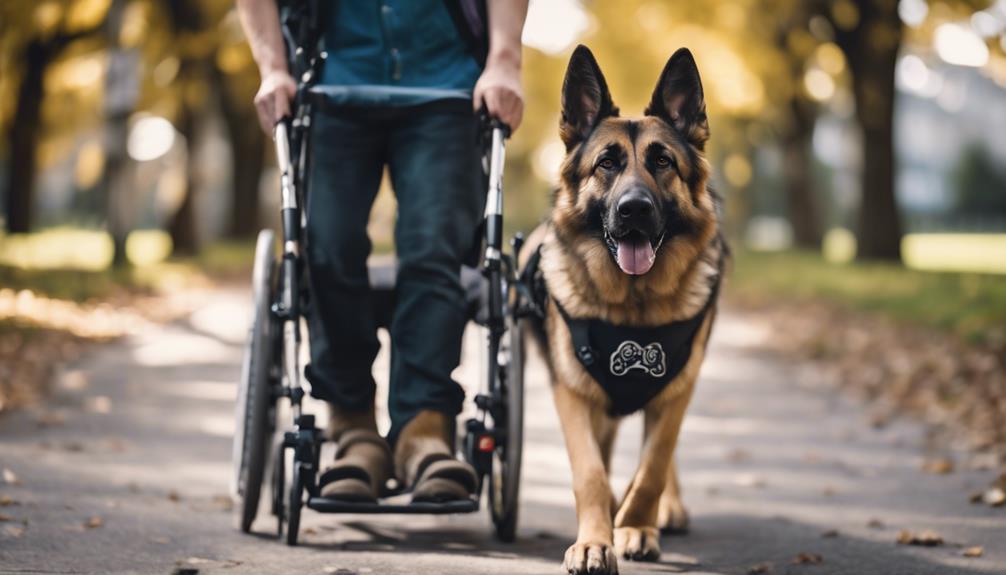🐾 Paw-some Partnership Alert! 🐾
As a pack of German Shepherd enthusiasts at MixGermanShepherd.com, we're always sniffing out the best products for our furry friends. Guess what? When you fetch something from Amazon through our links, we earn a little treat! 🦴
When considering training German Shepherd mixes for therapy work, you may find the task both challenging and rewarding. Their blend of strength and sensitivity can make them ideal candidates for bringing comfort to those in need. Understanding how to harness their unique qualities and guide them through specialized training can lead to impactful outcomes. So, how can you effectively prepare these intelligent and loyal dogs to become trusted therapy companions?
Key Takeaways
- Assess temperament, socialization, and obedience training
- Consistent methods for shaping behavior and continuous evaluation
- Obtain certification for therapy work for volunteering opportunities
- Meet facility requirements and seek certification from recognized organizations
Assessing Temperament for Therapy Work
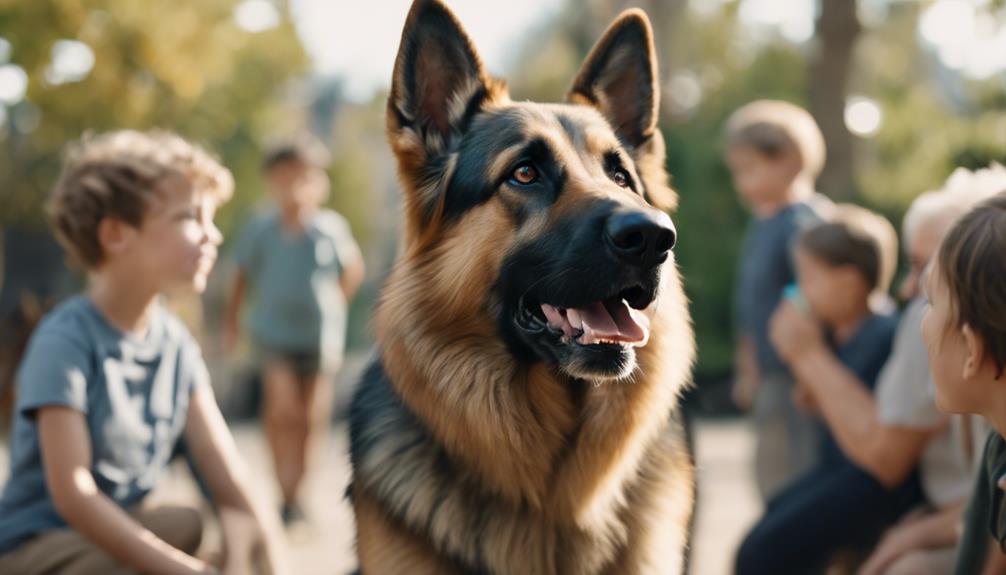
Assessing the temperament of a German Shepherd mix for therapy work involves closely observing their behavior in a variety of social situations to determine their suitability for providing emotional support. When evaluating their temperament, look for signs of calmness, friendliness, and adaptability in the dog's interactions with different people. It is essential to assess how the mix responds to stress, new environments, and handling, as these factors can greatly impact their effectiveness as therapy dogs. Additionally, consider the mix's comfort level with being touched, petted, and approached by strangers, as this will influence their ability to connect with individuals in need of emotional support.
Observing the mix's ability to remain composed, gentle, and patient when interacting with those requiring emotional assistance is crucial. A therapy dog must exhibit stability and reliability in various social scenarios to ensure they can provide comfort and aid effectively. By carefully analyzing these aspects of their temperament, you can determine whether a German Shepherd mix is well-suited for therapy work.
Obedience Training for Therapy Dogs
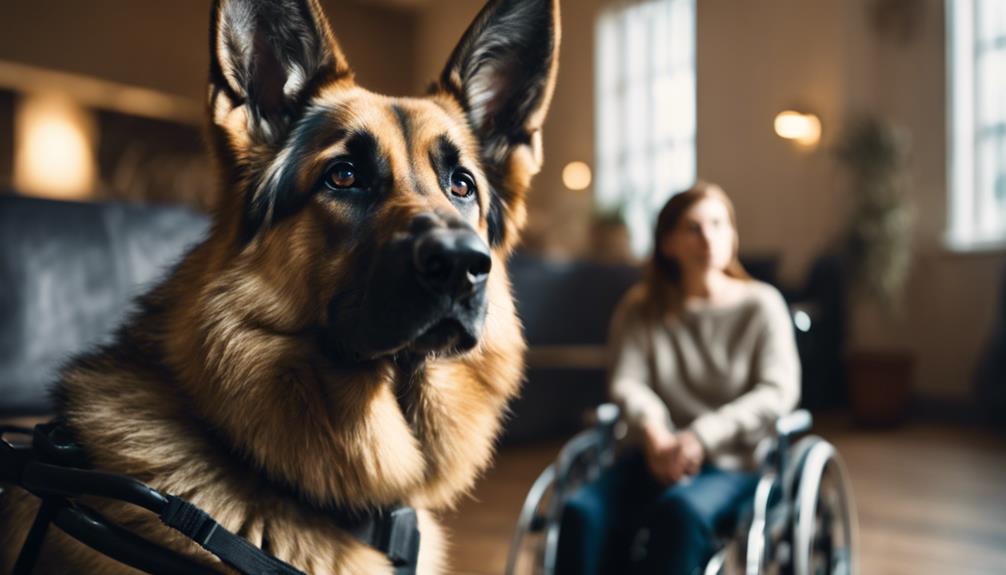
When training therapy dogs, focusing on basic commands such as sit, stay, and leave it is crucial. Consistent training methods are essential to reinforce these commands effectively. By establishing a strong foundation in obedience training, therapy dogs can demonstrate good manners and quick responses, enhancing their performance in therapy work.
Basic Commands Importance
To ensure the successful integration of German Shepherd mixes into therapy work, mastering basic commands through obedience training is crucial. When training therapy dogs, focusing on basic commands like sit, stay, and come is of utmost importance. Here are key points to consider:
- Basic commands are the foundation for therapy dogs to follow instructions reliably.
- Obedience training helps therapy dogs respond appropriately to cues during sessions.
- Teaching commands establishes effective communication between dogs and handlers.
- Mastery of basic commands enables German Shepherd mixes to concentrate on their role.
Consistent Training Methods
Mastering consistent training methods is essential for preparing German Shepherd mixes for therapy work, ensuring their behavior aligns with the requirements of their role. Obedience training plays a crucial role in shaping the behavior of therapy dogs by teaching fundamental commands such as sit, stay, and come. Through repetition and positive reinforcement, German Shepherds can effectively learn and retain these commands, setting the foundation for successful therapy work. Consistency in training not only helps in building trust and confidence in these dogs but also ensures reliable and predictable behavior essential for their role as therapy animals. By implementing these training methods with a focus on obedience training and positive reinforcement, German Shepherd mixes can be well-prepared to excel in their therapy work.
Socialization Techniques for Therapy Dogs
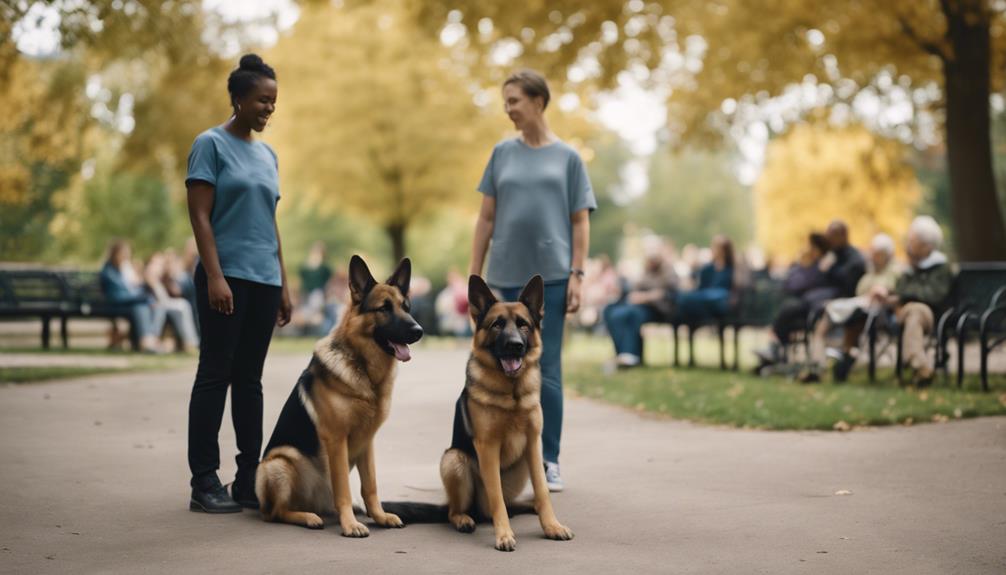
Effective socialization techniques are essential for preparing therapy dogs to interact calmly and friendly in diverse environments. To achieve this, consider the following strategies:
- Introduce dogs to various environments: Exposing therapy dogs to places like hospitals and schools helps them become accustomed to different settings.
- Exposure to stimuli: Ensure therapy dogs encounter various people, objects, and sounds to remain calm and friendly in diverse situations.
- Positive interactions with different individuals: Encourage therapy dogs to interact positively with people of all ages and backgrounds to enhance their social skills.
- Desensitization practices: Use desensitization techniques to help therapy dogs remain composed in potentially stressful or chaotic scenarios.
Employing these techniques, along with utilizing reward-based training methods, plays a crucial role in reinforcing desired social behaviors in therapy dogs during socialization exercises. By following these strategies, you can help your German Shepherd mix excel in their role as a therapy dog, providing comfort and support to those in need.
Building Trust With Vulnerable Populations
How can German Shepherd mixes effectively build trust with vulnerable populations during therapy work? Establishing trust is a fundamental aspect of successful therapy work. To build trust with vulnerable individuals, it is essential to create a safe and comforting environment. Consistent positive interactions, coupled with gentle approaches, play a crucial role in fostering trust. German Shepherd mixes should exhibit patience, empathy, and understanding to develop meaningful connections with those they are assisting. Tailoring trust-building activities to the specific needs and comfort levels of each individual is paramount. By ensuring that the environment is safe and conducive to healing, German Shepherd mixes can effectively engage with vulnerable populations and establish the trust necessary for impactful therapy work. Remember, building trust is a gradual process that requires dedication, sensitivity, and a deep commitment to creating a supportive and secure space for those in need.
Crisis Response Preparation for Therapy Dogs
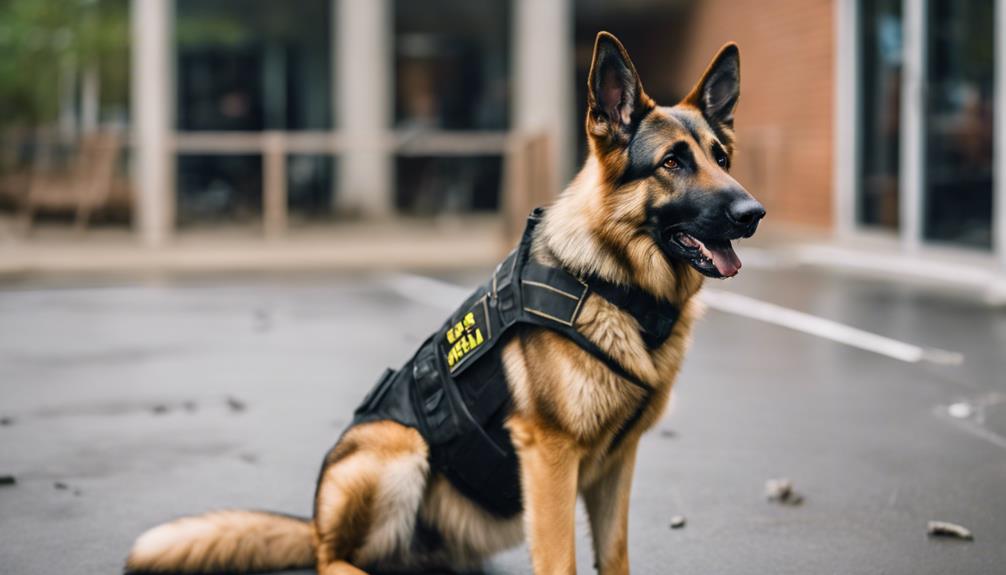
To excel in crisis response preparation for therapy dogs, focus on instilling a sense of calm and composure in challenging environments while teaching them to provide essential comfort and support during times of distress. Training techniques for crisis response in therapy dogs involve specific strategies to ensure they can effectively offer emotional support in various crisis situations. Here are some key elements to consider:
- Desensitization Training: Introduce therapy dogs to loud noises, chaotic environments, and unexpected situations to help them remain composed during crises.
- Empathy Building Exercises: Engage therapy dogs in activities that promote empathy and understanding towards individuals in distress, enhancing their ability to provide comfort.
- Crisis Simulation Scenarios: Create scenarios mimicking crisis situations to train therapy dogs on how to react appropriately and offer support when needed.
- Positive Reinforcement: Use positive reinforcement techniques to reward desired behaviors during crisis response training, reinforcing their ability to provide emotional support effectively.
Therapy Dog Certification Process
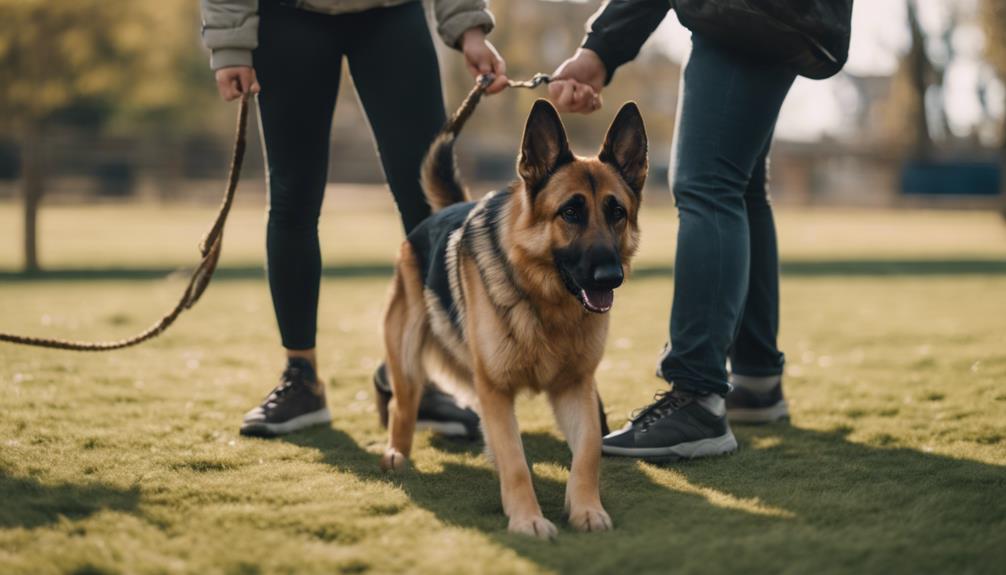
The certification process for therapy dogs involves undergoing training courses, evaluations, and monitoring by recognized organizations. These steps are essential to ensure that therapy dogs are well-prepared to provide comfort and support to those in need. Below is a breakdown of the therapy dog certification process:
| Aspect | Description | Importance |
|---|---|---|
| Training Courses | These courses cover basic obedience, socialization skills, and specific therapy dog training | Crucial for developing required skills |
| Evaluations | Dogs undergo temperament assessments, obedience tests, and simulated therapy scenarios | Ensures the dog can handle various situations |
| Monitoring | Continuous evaluation of the dog's performance and behavior in therapy settings | Maintains standards and quality of therapy |
Completing these requirements and obtaining certification not only validates the dog's abilities but also opens up opportunities for them to make a positive impact through volunteering in hospitals, schools, and disaster areas. Remember to check with specific facilities for their preferred therapy dog certification organizations to ensure compatibility with their requirements.
Frequently Asked Questions
Can German Shepherds Be Trained as Therapy Dogs?
Yes, German Shepherds can be trained as therapy dogs. Through obedience training and socialization, their temperament is evaluated for certification. They excel in bonding with individuals and providing support, making them ideal candidates for therapy work.
Can You Train Your Dog to Be a Therapy Dog?
You can train your dog to be a therapy dog! Utilize positive reinforcement techniques, enroll in certification programs, and focus on socialization and obedience training. The benefits of therapy work include providing comfort and support to those in need.
Are German Shepherds Good for Mental Health?
German Shepherds are excellent for mental health due to their emotional support, companionship, and benefits as therapy animals. Their ability to form strong bonds aids in promoting well-being, reducing stress, and fostering positive emotions.
Are German Shepherds Good for Ptsd?
German Shepherds excel in aiding individuals with PTSD. Their loyalty, intelligence, and calm demeanor benefit those in need. These therapy dogs can be trained in alerting to triggers, grounding techniques, and companionship for emotional support.
Conclusion
In conclusion, training German Shepherd mixes for therapy work requires patience, dedication, and a keen understanding of their unique needs. Remember, these intelligent and affectionate dogs have the potential to excel in providing emotional support to those in need. So, don't be intimidated by their reputation – with the right training and certification, your German Shepherd mix could become a therapy dog superstar, bringing comfort and joy to countless individuals in various settings.
